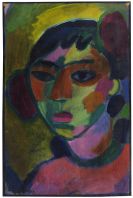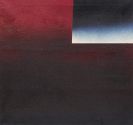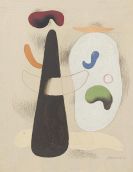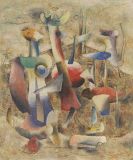
Giorgio Morandi
Bologna
1890 -
Bologna
1964
Giorgio Morandi was born in Bologna on July 20, 1890. He attends the Accademia di Belle Arti in Bologna from 1907 to 1913. In 1909 he encounters the work of Paul Cézanne, an encounter that has a substantial impact on Morandi. Around 1912 he makes first contact with the Futurists. In an event of the Futurists in the Teatro del Corso in Bologna in 1914, he gets to know Umberto Boccioni and Carlo Carrà. He participates in the "First Free Futurist Exhibition" in the Galleria Sprovieri in Rome the same year.
The artist also closely examines the Cubist style of Georges Braque and Pablo Picasso, as well as the painting of Henri Rousseau. Around 1918/19 he turns to the "Pittura Metafisica" and takes on motifs of Giorgio de Chiricos in his paintings. He joins the group "Valori Plastici" in 1922. As early as in 1920, Morandi restricts his choice of subjetcs almost exclusively to still lifes, with the exception of a few landscapes. His favorite colors are gentle and delicate tones, such as an earthen yellow, ochre, gray blue and rose. His contemplative still lifes usually show just a few plain bottles, cups, bowls and jars, which he always arranges anew. The simple object's plasticity is achieved by the right arrangement of light and dark areas. The objects are more and more reduced to their simple geometric shape as of the late 1930s, his stroke of brush remains visible, the attention is now turned to the application of the paint.
He also dedicates his extensive graphic oeuvre and drawings to still lifes, which do not have a less harmonic and contemplative effect.
From 1914 to 1930 Giorgio Morandi works as a drawing teacher in Bologna. From 1930 to 1956 he teaches as professor for graphic art at the Accademia di Belle Arti in his hometown. Giorgio Morandi shows eleven works in his own bnooth at the first documenta in Kassel in 1955. A year later, after he had already retired, the artist goes onto his first journey abroad on occasion of a joint exhibition with Gabriele Manzù in Winterthur, which is also where he visits the collection Oskar Reinhart, the Kunsthaus Zurich and the Kunstmuseum in Basel. He is awarded the Grand Prize for Etchings at the fourth Biennale in Sao Paulo in 1957. Despite his artistic success, Giorgio Morandi leads a rather secluded life in Bologna, spending the summers in the small mountain village of Grizzana.
Giorgio Morandi dies in Bologna on June 18, 1964.
Would you like to sell a work by Giorgio Morandi?
Infos for seller






